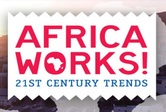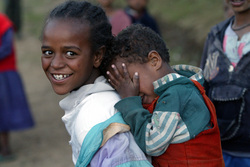 Over the years I had the priviledge of working with a number of faith-based organisations. They had to be conscious of avoiding use of public funding for actions that would support 'proselitism'. In recent years we witnessed a surge of religious sentiment, primarily driven by increasing attention to Asian traditions emphasizing holism and cosmopolitism. Bhuddism, Confucianism and other Asian traditions are embraced by both public and private entities for the purpose of self-efficacy. They have come up against the backdrop of increasing fundamentalism of fractions of mono-theistic religious systems carrying a truth-claim that no longer suffices for enligtened individuals in Western societies. Secondly, in the last decades a number of humanistic perspectives were religiously exported, supported by development programs and major donors. The other day I had a conversation with a Hivos staff member who supported this notion. We both observed that religious as well as humanistic perspectives often lacked appreciation of endogenic value systems in trying to bring change to societies where structural inequalities obscure the power balance. I reconsider the terminology and wonder what proselitism actually means. Is it not about making converts at the level of convictions, based on value systems often derived from ideologies? Is the same not true for business models: Some work, some don't? People swearing by ideologies like a 'free market' despite realities of increasing restrictions currently unfolding. We keep on implementing an economic growth model while currently that does not seem to make much sense. So where is the alternative? Yesterday's Africa Works gathering in Driebergen featured a workshop on Religious Entrepreneurship in Africa facilitated by senior researcher Benjamin Soares of the Africa Study Centre. The guest-speaker Dr. Asonzeh Ukah of the University of Bayreuth in Germany had a talk entitled "Jesus is Good for Business" presenting the Nigerian case. Apparently Jesus is acceptable as a salesman. Possibly even as a saviour, as long as he saves our business. I must say that I have little sympathy for the 'prosperity' gospel that often comes along with pentecostalism currently massively embraced by poorer segments of society in Africa and Latin-America. Nevertheless it is rightly stated that religion, economics, and entrepreneurialism are often rather closely intertwined in Africa. Could religion postively inform business? There are plenty of stories and proverbs linked to business realities worth taking to heart. Who knows, some souls may be saved in the process. Africa Works is an initiative of the NABC, the Africa Study Centre, NL Agency and the Ministry of Foreign Affairs.  No signs of the UK withdrawing from the continent with a strong contingent at the AidExpo in Brussels It was a bit weard, walking around at the AidExpo in Brussels this week. Listening to representatives of respectable agencies presenting facts to the audience as if everyone in the room had decided yesterday to engage themselves in humanitarian aid. Yes dad, let's go to the AidExpo! I really wondered what kind of audience was expected to come to this annual 'aid event'. A good exception to the sub-standard sessions in the plenary was the workshop on the Joint Standards Initiative that I attended. This is an initiative of the HAP, People in Aid and Sphere Project to come up with a joint standard against the proliferation of standards currently available. The JSI coordinator, Robert Shofield, updating the few attendees that had not interest in the future of the NGO as discussed in the main hall by Oxfam and others. Admittedly I turned up late, distracted by a few very enthousiastic colleagues from Ghana and the Philippines who had their stalls 'nicely' sidelined giving centre space to splendid expositions of the latest 4x4 models. Others possessing strategic locations were ECHO, the UK Trade initiative and a few other entities that had supposedly 'earned' a space in the middle. It is worth exploring the Expo floor plan to discover hierarchies in the business of humanitarian aid. I attended Shofield's session also with a business purpose, as I intended to turn in a bid for a consultancy for the Joint Standards Initiative (JSI) next day. Unfortunately apparantly there was sufficient choice with more experienced consultants applying as well. JSI staff managed to review the applications in less then a day rather efficiently as I received notice I was not selected for the lead-consultant post. Never mind, there is plenty of work around with funds looking for 'bankable' projects (of which there seems to be shortage). It's a strange world.  Moving earth or moving air in Ethiopia? Sometimes LinkedIn gets to you at the right time with the right quote. A public health professor in Ethiopia pointed to a quote of Ari Emanuel, co-CEO of William Morris Endeavor, the 'largest and global' talent agency. Mr. Emanuel listed 6 factors for success: 1. Surround yourself with people who are smarter than you and move out of their way; 2. The only constant in business is change. Get comfortable with it; 3. Fail often, fail quickly; 4. Your schedule makes you dumber; 5. You only get one shot – make it count; 6. Good ideas rule all. A good number of them somehow fell on me in the past couple of weeks. As my assignment with an NGO, supporting a funding application, came to an end I realised I was surrounded by a lot of people that were much smarter then me. There was no lack of change. I failed a couple of times and rather quickly. I was forced into a schedule and was forced out of it as well. I got one shot, and possibly raised seven million. Plenty of good ideas around, not ruling yet. I have to say, I was rather successful this month. Up for a new challenge! Also see: Managing and Delivering Peak Performance  Is it her brother or her child? 10-11-12 in British date notation above this article. Girls of this age in the highlands of Ethiopia may be given away in marriage to much older men, sometimes even after abduction. Today I spend almost entirely on the last bits and pieces of a proposal for a programme that needs to bring age appropriate knowledge on sexual and reproductive rights to these girls and boys. It should help bringing Comprehensive Sexuality Education to scale in contexts like these. I just realize this could have been the fate of my adoptive daughter from Ethiopia should she have stayed in the cultural setting where she was born. Currently she challenges (sometimes successfully) remnants of my patriarchal upbringing in a calvinistic home in the Netherlands. Trying to make sense of a context that still feels alien though having lived in Ethiopia for over six years, I had to support the write-up of an application for funding of a substantial programme for Comprehensive Sexuality Education, together with my colleagues here in the Netherlands and abroad. It was not easy to fill out the forms that were crafted by our Ministry of Foreign Affairs that had issued the call, answering all the questions that were asked on behalf of the Dutch tax payer. I frequently wondered whether those tax payers would really care to know. Should they have known the details, would they still plea for budget cuts in development cooperation? Faced with dramatic numbers, with 63% of women experiencing sexual abuse during their lifetime in Ethiopia, I realized how important this day of the girl child is. How come I did not even have time to say good night to my own girl childs, spending my evening on this proposal? |
About meMy name is Reinier van Hoffen. U®Reading
Click here for a summary.
Also find the text of a lecture Dr. Achterhuis held at the 2012 Bilderberg conference. Archives
August 2022
|
AddressNachtegaallaan 26
Ede, the Netherlands |
Telephone+31 (0)6 1429 1569
|
info@uraide.nl
|

 RSS Feed
RSS Feed
















